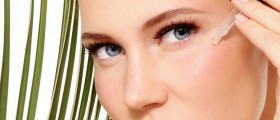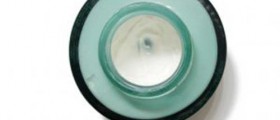After reading about copper peptides and their amazing anti-oxidant and anti-aging properties, I began seeking out products that contain copper peptides. I won't list the products I actually used because it does not matter much, but I use eye cream and a serum, both supposed to be among the very best copper peptides products on the market. I was expecting cell repair and line reduction. I was expecting to look better than ever before, and was told that clinical studies supported the claims made my manufacturers whose products contain copper peptides.
After using these products for a while, however, I did start seeing changes. They were not the changes I was expecting and hoping for though: they were the exact opposite. My skin became more sensitive and apparently thinner, and I started seeing more wrinkles, not less. My skin looks like a fragile sheet of rice paper now. At first, I was not sure whether copper peptides were really responsible for these changes or if they were unrelated, but when I started Googling this, it turned out that, contrary to the claim that copper peptides have no side effects at all, many people actually have similar issues.
I am sharing this in the hope that people who are looking for the ultimate anti-age solution in copper peptides will think twice and will do their research before going ahead.
I quit using copper peptides and live in hope that my skin will recover.
Loading...
Hiya,
Whoah. I have to say that sounds pretty severe and scary. Thanks for sharing I guess, but I do wonder... I've heard about copper peptides before and have even heard people comment that too much of them isn't good at all, but I'm not sure what products they're in, nor for whom their good and who can really end up with damage. What would copper peptides be listed as on ingredient lists? Just like that, or under other names too? I would definitely like to avoid them but who knows? Could be I'm already using cosmetics that contain copper peptides without knowing it?
Loading...
I will immediately admit that, although I am familiar with the term copper peptides, I really don't know much about them or about how they are supposed to work on a chemical level. Reading on the web as I often do though, I did come across bits and pieces where people advised to build the use of copper peptides up slowly, so to start with a very small amount and then to increase slowly. I have also read that copper peptides interact with vitamin C serum in a bad way. Do you know anything about that, perhaps? And do you now think copper peptides are always bad, or that they should just be used carefully?
Rosie
Loading...
Copper peptides can be great for the skin. They are best for people with uneven skin tones and discoloration. They can reduce scarring and promote healing as well, and many people use them for their anti-aging properties. Having said that, copper peptides are simply not for everyone. If you have active and fairly bad acne, then copper peptides are not for you. They are not good for people with oily skin types either, because they can make oily skin even oilier. Those people who have sensitive skin types or skin conditions should only use them after consulting a dermatologist, or, if you weren't diagnosed with anything, you can try a little bit out on a small (small!) portion of your face. If the "spot test" doesn't show allergic or otherwise undesirable effects, they will probably be fine for you.
Loading...
This story is not the first time I have heard bad reviews of copper peptides. Some swear by them, others swear at them, LOL. I am currently struggling with sun damage and wrinkles and would love a product that could rejuvenate my face. Because copper peptides do get a bad press, I was not really considering using them. Why risk it, you know? Your post makes me think again though because your description makes it sound like they are essentially perfect for my skin. What product would you recommend, so I can look it up more?
Loading...
- Redness and irritation of the skin. This is particularly true if users apply more than recommended. Following the recommendations of the manufacturer is key here.
- Copper in too large an amount can result in digestive problems, abdominal pain, nausea and vomiting, because your liver cannot cope with filtering too much copper out.
- Facial sagging and excessive wrinkles.
Using copper peptides in large amounts means you are placing yourself at risk of seeing an effect that is the opposite of what you signed up for. Not many mainstream over the counter skincare brands use them as far as I know, and you have to seek out copper peptides actively to get them. Those who use them in small amounts may not see any harsh effects but if you use too much, watch out. Many people have tossed their copper peptide products after noticing increased wrinkling and sagging as well as irritation.
Loading...
Loading...
Loading...
My hair grew back after I quit taking the Ceralift Supplement , but my hair texture is wiry, dry and very curly; it was not that way before I took Ceralift. I cannot for sure know if it was the Supplement that caused the hair loss etc. But, I am glad my hair grew back even though it isn’t as it was before.
Loading...
Loading...
Hello guest.
Copper peptides can indeed be found in various skincare products and, in some cases, even in injectables. They are often used for their potential benefits in promoting collagen production and skin regeneration. However, as you mentioned, using them in excess or without proper knowledge can lead to issues, so it's important to be informed about their presence in your skincare products.
Copper peptides can be listed under various names on ingredient lists, and it's essential to check for these names:
-
Copper Peptide: Some products may list it directly as "Copper Peptide" or "Copper Tripeptide."
-
Copper PCA: This is another common name for copper peptides, where PCA stands for Pyrrolidone Carboxylic Acid.
-
Copper Gluconate: Copper gluconate is a compound that contains copper and gluconic acid. It can be used as a source of copper peptides in skincare products.
-
Copper Amino Acid Chelates: Copper can also be chelated with amino acids, and these may appear on ingredient lists as "Copper Amino Acid Chelates."
-
Copper Sulfate: While not a copper peptide itself, copper sulfate is sometimes used in cosmetic formulations, so it's worth noting.
As for injectables, copper peptides are sometimes used in mesotherapy treatments or other cosmetic procedures. These treatments are typically administered by medical professionals and should not be attempted without proper guidance and supervision.
Loading...















